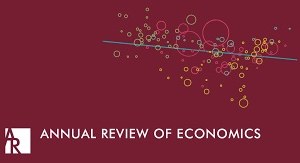
Wagener, F. (2014). Expectations in experiments Annual Review of Economics, 6:421--443.
-
Affiliated author
-
Publication year2014
-
JournalAnnual Review of Economics
The rational expectations hypothesis is one of the cornerstones of current economic theorizing. This review discusses a number of experiments that focus on expectation formation by human subjects in a number of learning-to-forecast experiments and analyzes the implications for the rational expectations hypothesis. In these experiments, most agents are rational in an operational sense, and their expectations coordinate quickly, but not necessarily on the rational expectations value. In several situations, the homogeneous rational expectations hypothesis of Lucas and Prescott poorly describes the expectational dynamics and is outperformed by other hypotheses. But even in those situations in which the hypothesis gives a good description, it is more likely that coordination on rational values is brought about by the institutional structure of the market rather than the rationality of the agents.